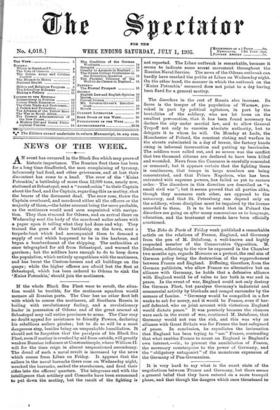If the whole Black Sea Fleet were to revolt, the
situa- tion would be terrible, for the mutinous squadron would menace all Russian ports. The Czar has no other fleet left with which to coerce the mutineers, all Southern Russia is boiling with revolutionary feeling, and a revolutionary leader in possession of Odessa and of the great arsenal at Sebastopol may call entire provinces to arms. The Czar may no doubt appeal for assistance to friendly Powers, declaring his rebellious sailors pirates ; but to do so will be a most dangerous step, besides being an unspeakable humiliation. It should not be forgotten that the paralysis of his Black Sea Fleet, even if mutiny is crushed by aid from outside, will greatly weaken Russian influence at Constantinople, where William II. will for the time reign in almost unquestioned ascendency. The dread of such a naval revolt is increased by the news which comes from Libau on Friday. It appears that the sailors in the naval barracks there rose on Wednesday night, wrecked the barracks, sacked the storehouses, and fired their rifles into the officers' quarters. The telegrams end with the intelligence that artillery and Cossacks have been summoned to put down the mutiny, but the result of the fighting is not reported. The Libau outbreak is remarkable, because it seems to indicate some secret movement throughout the Russian Naval Service. The news of the Odessa outbreak can hardly have reached the public at Libau on Wednesday night. On the other hand, the manner in which the outbreak on the giniaz Potemkin' occurred does not point to a day having been fixed for a general mutiny.










































 Previous page
Previous page